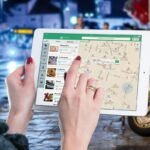These days, many people are leaving their nine to five office jobs and switching over to become digital nomads. It’s a great lifestyle, whether you’re a blogger, an online teacher, or a coder because you can live wherever you want and work when you want.

But because this is a lifestyle that’s just becoming popular now, there are still a lot of lessons new digital nomads need to learn. One of these lessons in knowing how to save money, even when they’re hopping on flights to new cities or buying a coffee at every coffee shop they sit down to work at with a laptop.
Luckily, there are some great strategies you can use to save money while running your digital nomad business. To learn more about how to save while living the business life of your dreams, read on.
Save up before you go
Many digital nomads want to quit their job immediately, and head off to an exciting country with a business idea they’re sure will make money. But this is financially irresponsible. It’s best to start slow.
If you’re absolutely sick of your nine to five job, take on a part-time job where you live, and spend the rest of your time slowly building your business. Once you’ve got enough money and clients you know you can keep working for no matter where your travels take you, you can buy a ticket to wherever you want to go.
And when you do buy a ticket, use a flight aggregator such as Google Flights or Hipmunk so that you’ll save money. According to the 2018 Airfare Study, the average best time to buy is 47 days, or about 1.5 months in advance–so prepare your work calendar for that.
Create a budget
Before you start your digital nomad lifestyle, you also have to create a budget. One of these is your business budget. Figure out what your expenses will be (for example, a new laptop or portable printer), and project as far as you can into the future.
Additionally, you need a lifestyle budget. Figure out what rent prices are where you’re going to, and how much you’ll expect to spend on anything from weekly groceries to your monthly coworking space fee. Allocate some money for savings and emergencies, too.
50 percent of the workforce will be remote by 2020, which means that you can find a lot of sample digital nomad business budgets online to work from. Take a look, for example, at these business plan tips from Digital Nomad Europe.
Be smart about taxes
Americans, even when they’re living abroad, have to report taxes back to the US. It’s annoying, but on the bright side, you have to be making a lot of money if you’re going to end up paying them. According to the Incfile blog.
“Just because you may not live in the U.S. for the bulk of the year, that does not mean you are necessarily exempt from having to pay U.S. taxes. If you hold more than $10,000 in a non-U.S. bank or investment account, then there may be extra filing requirements too…You should research what types of items can be written off by owning a digital nomad business. For example, foreign housing may be deductible in certain circumstances.
And if you are out of the U.S. for 330 days a year, you may be able to get tax relief on some or all of your earnings. This includes the ‘Foreign Earned Income Exclusion,’ which lets Americans who live abroad exclude the first $100,000 or so that they earn from U.S. tax liability.”
By being as knowledgeable as possible about your taxes, you’ll save money. Considering that the average monthly housing expenses for digital nomads surveyed averaged only $660, understanding your financial obligations will save you a lot of money.
Connect with other digital nomads

Finally, don’t forget about the importance of personal connections. Especially in the digital nomad community, people want to support each other. For example, if you write a blog article about what constitutes a podcast and interview a digital nomad podcaster, they might let you stay for free in Bali when you fly over for a visit. Even you can try work from home jobs to earn extra money and save more money.
Even if you’ve only met online, that’s considered a friendship in many digital nomad circles. Join Facebook and Instagram travel groups, and make connections at digital nomad cafes and conferences, too.
Considering that loneliness and difficulties of collaborating and communicating were ranked highest (21 percent) for digital nomad woes in a survey, plenty of them will want to connect with you and meet with you in person.
These are some of the best ways to save money while running your digital nomad business. What other strategies do you think would be useful?






